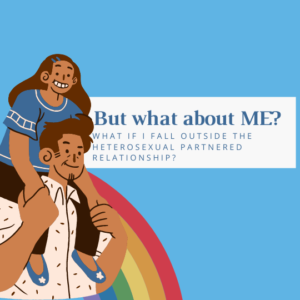But what about ME?
What if I fall outside the heterosexual partnered relationship?
What if I fall outside the heterosexual partnered relationship?
 There is a lot of information and research pertaining to mothers on pregnancy, birth/ delivery, and postpartum depression. There is also some helpful information available for fathers, who can experience symptoms of postpartum depression.
There is a lot of information and research pertaining to mothers on pregnancy, birth/ delivery, and postpartum depression. There is also some helpful information available for fathers, who can experience symptoms of postpartum depression.
But what about ME?
What if I fall outside the heterosexual partnered relationship?
Yes, this information applies to you too!
Lesbian, bisexual, and queer women who are more “visible” sexual minority women such as those currently partnered with a man but have a history of being in sexual relationship with women can also experience symptoms of peripartum depression. Queer and trans partners are also impacted and considered at higher risk as well as persons of color.
Changes in mood, sleep, appetite, and energy levels in response to the adjustment of new parenthood is common as well as irritability, increased anxiety, and emotional exhaustion.
Having a personal or family history of mental health disorders, especially depression or a mood disorder such as bipolar can make one more susceptible to depression. In addition, having limited supports, relational conflict, and financial stressors can also exacerbate symptoms.
Fathers, partners, and LGBTQIA+ parents may struggle with feeling bonded with their child in the same way the custodial parent is connected, particularly the non-gestational-parent. They may feel left out of routines such as pregnancy, breastfeeding, and medical care. When there is relational conflict, a parent may miss out on both emotional and physical opportunities to connect with the baby. This can be experienced as grief. Struggles with infertility and pregnancy loss are also important to note.
Depression, grief, and anxiety can be present in the prenatal (before birth), perinatal (time of conception until after birth), or postpartum (first year following birth) periods.
Non-married fathers in Minnesota and those who do not have legal status as the birth mother or “custodial parent”, face challenges in regards to paternity, custody, and parenting-time.
LGBTQIA+ families who are pursuing having a child through adoption, foster care, or the use of assisted reproductive technologies such as insemination with a sperm donor, in vitro fertilization (with or without a gestational carrier) with an egg, sperm, or embryo donor also face unique challenges regarding to parental rights, adoption, and the law.
It can be difficult to find comparable supports to process experiences and cope, especially when resources may have a bias towards mothers and heteronormativity. Fathers/ partners, adoptive parents and individuals are part of the LGBTQ community may feel underrepresented or excluded. Finding supports that can help validate emotions and experiences can be so helpful since no one is immune to postpartum depression nor the complexities of systems that can trigger emotional distress.
Resources:
Fathers/ Partners
https://ppsupportmn.org/perinatal-postpartum-support-for-dads/
https://theminnesotabirthcenter.com/supporting-dads-and-partners-in-the-postpartum-time/
LGBTQIA
https://www.postpartum.net/get-help/queer-parents/
https://ppsupportmn.org/lgbtqia/
https://adoptionart.org/find-an-attorney/attorney-directory/#!directory/map/ord=lnm/xmn=1
https://connectingrainbows.org/
Written By: Charlotte Johnson, MA, LPCC
Our wellness experts will be happy to take care of you. You can CLICK HERE to schedule an appointment now or call (612)223-8898.
We’re united by our commitment to providing effective, relevant, and innovative mental health support at all stages of your journey. Click Here to find out more about who we are, where we come from, and how we live out CARE’s mission every day.
The professionals at CARE are actively collecting and creating resources to help with what you need. We’re Here for You.

 High Functioning Depression “I’m Good”
High Functioning Depression “I’m Good”